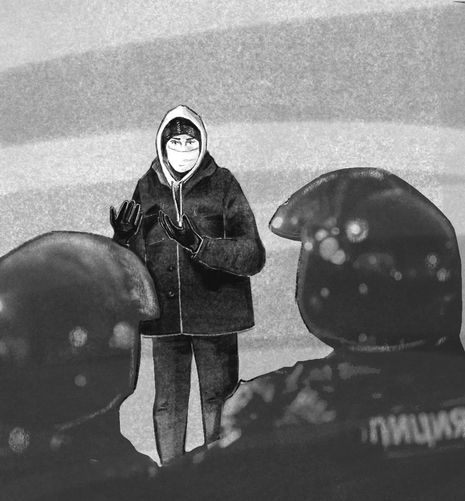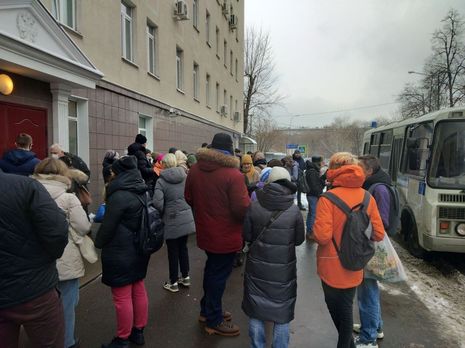POV: You don’t like Putin
Ilja Caikovskis relates the experience of living through political protests in Russia… while doing his Cambridge degree

Content Warning: This article contains detailed discussion of protests, police brutality and torture
The first thing in the morning is YouTube. This Tuesday I don’t have a choice but to watch 7 hours of a live stream from the court hearing of Alexey Navalny. The tension many of us feel whilst listening to the monotonous speech of a judge is tremendous. The almost inaudible droning that is meant to be a verdict is in fact deciding the fate of the last chance for democracy in Russia. Spoiler: democracy died at 8.21 pm that night.
Twenty minutes later one of my friends goes out to a protest in Moscow. Well, Russian government media always uses terms like terrorists, riots and vandalism. In reality, the only non-peaceful part of the protest is, as usual, the riot police. My friend is walking around the rally’s supposed location and sending pictures of other protesters. They are not afraid of the army looking more like stormtroopers or space robots than actual humans.
Around 1400 protesters are detained that night – less than the 4000 and 5600 during the previous two weeks, but this is not much consolation. Some of them are detained especially brutally, with batons and tasers. My friend and his girlfriend look fine in the photo they send from a police van, which means that the police officer wasn’t that sadistic. A few hours later a photo from the same van is posted by an arrested journalist – something illegal even for the corrupt standards of Russian law. Anyway, we know he will be released with a fine the same night.
“They will always be found and helped by their friends, relatives and thousands of selfless volunteers that stand by the unlawfully arrested”
The first thing in the morning is Telegram. He has neither replied nor read any of our messages. This means that the police officers have confiscated his phone. It also means the case they are trying to make up against my friend has the possibility of him being arrested for up to several weeks. His name is also not published by the local protester rights organisation. Concerning.
An hour later I’m calling the police and pretend I’m searching for my brother. Not much you have to know to prove this: if you’re lucky, just a full name and birthday. A few minutes later the officer gives me a police station’s address. Another very polite officer tells me that my ‘brother’ is getting transported to court. With that in mind, I go out to repair my laptop to attend a course group project call for university. I don’t know that the police officer has lied.
My friend will not leave the police station that day. Every hour or so I would open the court web page to not find his name again. Well, I think, Moscow is big and they might pass other police stations on their way. At around 6 pm I see a news article: “They put a bag over my head and beat me up”. The worst thoughts are racing through my head while I’m waiting for a page to load. Relief – the police tortured other people. Good. I breathe out. At 8 pm I see a retweet of an article by the very same journalist from my friend’s police van.
“If you mention the 51st article of the Constitution [right not to testify against oneself], the police officer threatens you with ‘the basement’”
“From somewhere, seemingly from another floor, you can hear a shrill scream, ‘They’re killing, they’re killing!’. The man repeats this a few more times and stops.”
Сoncerned? No. Absolutely terrified. What if he is the man? What if he is forced to confess crimes he hasn’t committed? What if they pin something like terrorism, extremism or even drug dealing on him? What if he is dead?
I find his parents’ phone number and message to check on them. They don’t know a thing about cases against protesters: they don’t know what the process is, they don’t know who to ask for help, they just don’t know what to do. So now I have to make sure that my friend and at least some other detainees will have a defender in court. While monitoring tens of group chats with hundreds of people in the same situation, I juggle with the list of names and ask several organisations for an attorney. They promise to help.

The first thing in the morning is the court. Because of COVID-19, nobody but an attorney, police officers and protesters can enter. Very convenient that it’s never a reason not to lock 20 people in a tiny cell. Quite a crowd outside: they have no power over judges printing sentences.
This crowd, though, has its reasons to be here. People from the van haven’t had a chance to contact the rest of the world for 36 hours. But now they can see through this black unbreakable glass and know that they are found. They will always be found and helped by their friends, relatives and thousands of selfless volunteers that stand by the unlawfully arrested.
We have a brief chat with him. One minute from the van to the court; one minute from the court to the van. A few hours later we’re waving at the police car that is taking him on an 8-day long trip to jail. All the Moscow jails are overflowed with dissidents. They’re held overnight in the cold vans while -10 degrees outside. The same will happen to my friend until he is transferred 120km away from Moscow.
In the morning the first thing is group chat. Still no information. In the afternoon there is a message with a list of the names. That’s the etiquette: the first arrested to have contact tells the names of others. Our friend is finally in jail. Therefore, he is safe now. Therefore, I can watch a lecture.
Context: Alexey Navalny is a Russian opposition leader who survived an assassination attempt last August. On his return to Russia from Germany, where he has been undergoing treatment, he was immediately detained. There have been large protests in Russia in response to this arrest.
 News / University Council rescinds University Centre membership20 February 2026
News / University Council rescinds University Centre membership20 February 2026 News / Hundreds of Cambridge academics demand vote on fate of vet course20 February 2026
News / Hundreds of Cambridge academics demand vote on fate of vet course20 February 2026 News / Judge Business School advisor resigns over Epstein and Andrew links18 February 2026
News / Judge Business School advisor resigns over Epstein and Andrew links18 February 2026 News / Union cancels event with Sri Lankan politician after Tamil societies express ‘profound outrage’20 February 2026
News / Union cancels event with Sri Lankan politician after Tamil societies express ‘profound outrage’20 February 2026 News / Caius students fail to pass Pride flag proposal20 February 2026
News / Caius students fail to pass Pride flag proposal20 February 2026









